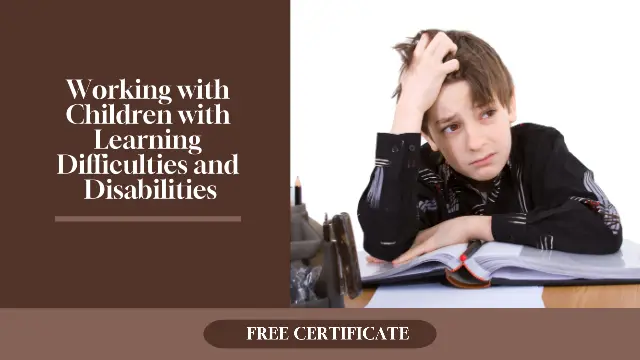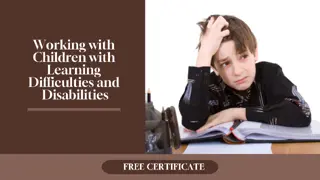
Working with Children with Learning Difficulties and Disabilities
Interactive Video Lessons | Free E-Certificate | Tutor Support
METAVERSESKILLS
Summary
- Certification of Completion - Free
- Tutor is available to students
Add to basket or enquire
Overview
This comprehensive online course is designed for educators, caregivers, and professionals who work with children with learning difficulties and disabilities. It provides essential knowledge, strategies, and practical skills to effectively support and empower these children to reach their full potential.
Certificates
Certification of Completion
Digital certificate - Included
Description
**Module 1: Understanding Learning Difficulties and Disabilities**
1.1 Introduction to Learning Difficulties and Disabilities
- Differentiating between learning difficulties and disabilities
- Common types of learning difficulties and disabilities
1.2 The Impact on Learning and Development
- How learning difficulties and disabilities affect a child's cognitive, emotional, and social development
- Recognizing early signs and indicators
1.3 Legislation and Inclusion
- Overview of laws and policies related to inclusion and special education
- The importance of an inclusive classroom environment
**Module 2: Assessment and Diagnosis**
2.1 Assessment Tools and Techniques
- Overview of assessment methods
- The role of assessment in identifying learning difficulties and disabilities
2.2 Collaborative Approach
- Working with parents, specialists, and other professionals
- Developing individualized education plans (IEPs)
2.3 Case Studies and Practical Application
- Analyzing real-life cases
- Developing strategies based on assessment results
**Module 3: Strategies for Teaching and Support**
3.1 Differentiated Instruction
- Adapting teaching methods and materials
- Addressing diverse learning needs
3.2 Assistive Technologies
- Introduction to assistive devices and software
- Incorporating technology into the learning process
3.3 Behavior Management and Social Skills
- Strategies for managing challenging behaviors
- Promoting social interaction and inclusion
**Module 4: Creating Inclusive Learning Environments**
4.1 Universal Design for Learning (UDL)
- Principles of UDL
- Applying UDL in lesson planning
4.2 Classroom Accommodations and Modifications
- Making physical and environmental adjustments
- Providing extra support and resources
4.3 Building Empathy and Awareness
- Fostering a culture of acceptance and understanding
- Educating peers about learning difficulties and disabilities
**Module 5: Supporting Emotional and Psychological Well-being**
5.1 Emotional Challenges
- Identifying emotional struggles in children with learning difficulties and disabilities
- Strategies for emotional support
5.2 Self-esteem and Resilience
- Building self-esteem and resilience in children
- Encouraging a growth mindset
5.3 Working with Families
- Collaborating with parents and guardians
- Providing emotional support to families
**Module 6: Evaluation and Continuous Improvement**
6.1 Monitoring Progress
- Methods for tracking a child's development and progress
- Making adjustments to strategies and interventions
6.2 Ethical Considerations
- Ensuring ethical conduct when working with children with disabilities
- Respecting confidentiality and privacy
6.3 Professional Development
- Staying up-to-date with current research and practices
- Networking and accessing resources
Who is this course for?
- Receive a certificate of completion
- Evaluating your understanding and knowledge gained from the course
- Reflecting on key takeaways
- Preparing for future work with children with learning difficulties and disabilities
Requirements
No prior knowledge or experience required
Career path
Teachers
Teaching assistants
Pastoral care
Nursery Staff
Daycare workers
Childcare workers
Social workers
Volunteers
Questions and answers
Currently there are no Q&As for this course. Be the first to ask a question.
Reviews
Currently there are no reviews for this course. Be the first to leave a review.
Legal information
This course is advertised on reed.co.uk by the Course Provider, whose terms and conditions apply. Purchases are made directly from the Course Provider, and as such, content and materials are supplied by the Course Provider directly. Reed is acting as agent and not reseller in relation to this course. Reed's only responsibility is to facilitate your payment for the course. It is your responsibility to review and agree to the Course Provider's terms and conditions and satisfy yourself as to the suitability of the course you intend to purchase. Reed will not have any responsibility for the content of the course and/or associated materials.


